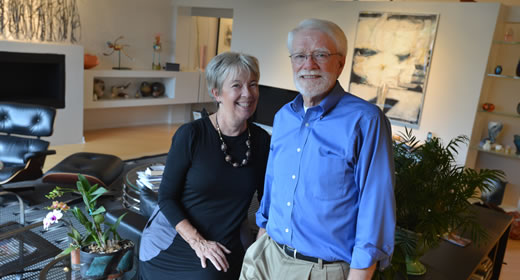
By Jeff Mortimer
In the present, John Chamberlin is teaching an undergraduate course on U.S. inequality, even though he’s officially retired.
In the past, he taught statistics, and values and ethics in public policy, and led the launch of the Ford School’s undergraduate program.
And in the future, beyond whatever other contributions he continues to make as an emeritus professor, master’s of public policy students will benefit from a $100,000 bequest that he and his wife, Marsha Chamberlin, longtime head of the Ann Arbor Art Center, have included in their will. Typically, John’s not only teaching about inequality, but doing his part to remedy it as well.
“Making it possible for good students to come here and serve the public without going broke seemed to me to be the best investment,” John says. “Most of these master’s students have decided somewhere along the way that they’d rather do this than get a law degree or an MBA. They didn’t grow up wanting an MPP. There’s a sense that they’re willing to not be as rich as they could be in order to see the world make progress in some areas they care about. I like teaching students who have a commitment to something beyond themselves.”
That sounds a lot like John himself. He probably could have parlayed his degrees in engineering and business into a more lucrative career but, in 1970, he accepted an offer to teach in the year-old Institute of Public Policy Studies, the Ford School’s forerunner, and the University’s outstanding Department of Political Science. He’s been teaching here ever since, in addition to serving as director and interim dean, helping found the undergraduate public policy program, and creating a course in ethics that’s now a core requirement for all graduate students.
“A professional school turned out to be the right home for me,” Chamberlin says. “It’s been a nice way to do things I was interested in that would have been hard to do if I’d had a 100 percent appointment in an academic department. You get to teach students who are passionate about finding solutions to tough societal challenges, and the school has always been very flexible about people teaching what they want to teach.”
Ethics, for example. “Along the way, I got interested in normative issues in public policy, which wasn’t my background at all,” he says, “and students were interested in having a course in ethics and public policy. It turned out to be a great match.”
If it’s good for students, John is on board. There were a variety of reasons for starting a bachelor’s program, but the trump card for him was that it could encourage undergraduates to pursue careers in public service. And, he says, it does.
“I think it helps a little [for undergrads] to say, ‘I had a specialty in some policy area,’” John points out. “It’s a little different than saying, ‘I know some things about an academic discipline.’ The students like the applied nature of it. We’ve had a few go on to PhD programs, but most of them want to go out and see what the world is like. And they’ve got to be able to think in a multidisciplinary way. One of the things I’ve always loved about this school is having colleagues from lots of different backgrounds. This has been a nice place to be able to come home to, particularly once we had a nice home.”
Marsha Chamberlin concurs. She describes the school as informal, family-friendly, and just plain friendly. She mentions the fact that her own children often sat in the back of the classroom during lectures and events. She talks about the lack of rigid hierarchies between faculty and students. And she reminisces about the skits—the holiday skits—a long-time tradition at the school. The best skit? There’s no hesitation. “That was the year that Jeff Mackie Mason (MPP ’83) imitated John,” she says, laughing. She can’t remember the content of the skit, and neither can John, but they both remember the warmth and humor.
“The faculty have always tried to do something that involved the students outside of the general coursework,” says John. “And the value of the kind of education people get at the Ford School is, I think, very special,” Marsha adds.
It would also be nice to “have some alums who launch successful businesses and earn a fortune,” John adds, given how crucial alumni support is to the prosperity of any school, but since that’s rarely in the cards, he and Marsha have stepped up to redress the balance a bit.
“Our graduates have debts, their starting salaries are below those from the business and law schools, and we’re always competing with the Kennedy School and the rest of them that have more money than we do,” John notes.
But even a level of dedication like theirs has its limits. “I’m not teaching winter term,” John says. “If this winter is anything like last winter, Marsha and I are getting in the car and driving south.”
Below is a formatted version of this article from State & Hill, the magazine of the Ford School. View the entire Fall 2014 State & Hill here.